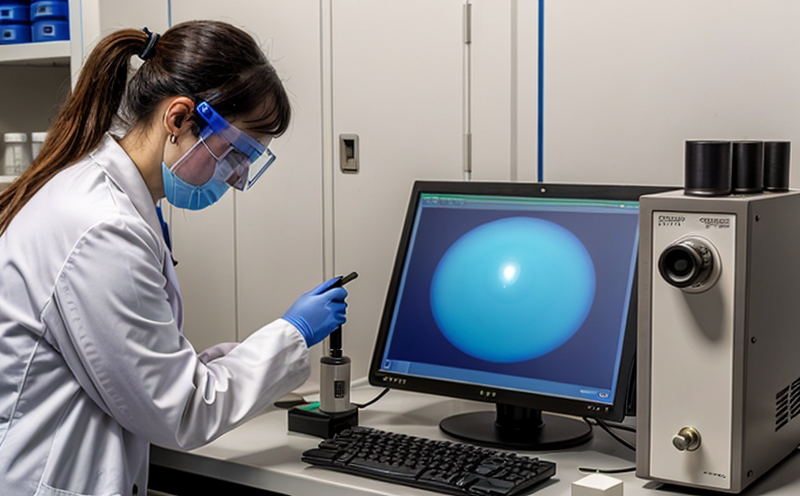IEC 61215 Photovoltaic Module Spectroscopic Testing
The IEC (International Electrotechnical Commission) standard IEC 61215 is a comprehensive set of requirements that govern the performance, safety, and durability of photovoltaic modules. This standard ensures that manufacturers adhere to rigorous testing protocols to ensure the reliability and longevity of solar panels.
The Photovoltaic Module Spectroscopic Testing under IEC 61215 focuses on evaluating the efficiency, spectral response, and other critical parameters that affect a module's performance in real-world conditions. This testing is essential for quality assurance (QA) and compliance officers who need to ensure their products meet stringent international standards.
The spectroscopic analysis involves measuring how much light of different wavelengths passes through or is absorbed by the photovoltaic material. This data helps determine the efficiency of a module, which is crucial in renewable energy applications. The testing process is meticulous and requires advanced instrumentation capable of capturing detailed spectral information.
This service ensures that manufacturers can meet stringent international standards for solar panel production. R&D engineers rely on this testing to innovate and improve product performance. Compliance officers use the results to ensure products are up-to-date with regulatory requirements, thus minimizing legal risks associated with non-compliance. Procurement teams also benefit from this testing as it helps them select high-quality suppliers who adhere to these stringent standards.
The testing process typically involves several steps:
- Sample preparation: Ensuring the sample is clean and free of contaminants that could affect test results.
- Spectroscopic measurement: Using advanced instrumentation to measure how light interacts with the photovoltaic material.
- Data analysis: Processing the collected data to determine efficiency, spectral response, and other relevant parameters.
- Reporting: Providing detailed reports that include all test results and interpretations of the findings.
The IEC 61215 standards are widely recognized in the photovoltaic industry. Compliance with these standards is essential for manufacturers who want to ensure their products meet international quality benchmarks. The testing process helps identify potential issues early on, allowing manufacturers to address them before product release.
Why Choose This Test
Selecting the IEC 61215 Photovoltaic Module Spectroscopic Testing is a strategic decision that offers several advantages. Firstly, it ensures compliance with international standards, which is crucial for global markets. Secondly, this testing helps manufacturers identify potential issues early in the production process, reducing costs and improving product quality.
The detailed insights provided by this service enable R&D engineers to innovate and improve their products continuously. Compliance officers can use these results to ensure that all products meet regulatory requirements, thus minimizing legal risks associated with non-compliance. Procurement teams benefit from knowing which suppliers are adhering strictly to these stringent standards.
- Comprehensive data on efficiency, spectral response, and other critical parameters.
- Precise identification of potential issues early in the production process.
- Enhanced reputation among customers who value quality and compliance.
- Increased market competitiveness due to superior product performance.
The testing process is rigorous and ensures that only high-quality products reach the market. This commitment to excellence sets a benchmark for the industry, ensuring that consumers can trust in the reliability of photovoltaic modules they purchase.
Customer Impact and Satisfaction
The IEC 61215 Photovoltaic Module Spectroscopic Testing has a direct impact on customer satisfaction. By adhering to these stringent standards, manufacturers can produce high-quality products that perform reliably under various conditions. This not only enhances the reputation of the brand but also builds trust among customers.
Customers who purchase photovoltaic modules from compliant manufacturers benefit in several ways:
- Higher efficiency and reliability of the product.
- Longer lifespan, reducing the need for frequent replacements.
- Better performance in real-world conditions, leading to increased energy production.
Moreover, compliance with IEC standards demonstrates a commitment to quality that resonates positively with customers. This can lead to repeat business and positive word-of-mouth recommendations, further enhancing customer satisfaction.
The testing process also ensures that products meet the expectations set by regulatory bodies, which helps in avoiding legal issues and penalties associated with non-compliance. This adds an additional layer of value for customers who rely on compliant products for their installations and operations.
Competitive Advantage and Market Impact
The IEC 61215 Photovoltaic Module Spectroscopic Testing provides a significant competitive advantage in the renewable energy market. By ensuring that products meet these stringent standards, manufacturers can differentiate themselves from competitors who may not adhere to such rigorous protocols.
- Enhanced Quality Reputation: Compliance with IEC 61215 standards enhances the reputation of the brand, making it more attractive to discerning customers and potential partners.
- Innovation Leadership: Continuous improvement through detailed data analysis allows manufacturers to stay ahead in technological advancements.
- Regulatory Compliance: Ensuring compliance minimizes legal risks and can open up new markets where stringent standards are required.
- Customer Trust: By adhering to these international standards, manufacturers build trust with their customers, leading to increased loyalty and repeat business.
The market impact is also notable. Compliance with IEC 61215 standards can lead to a broader customer base, as more regions adopt stringent regulations for photovoltaic products. This creates new opportunities for growth and expansion into international markets.





